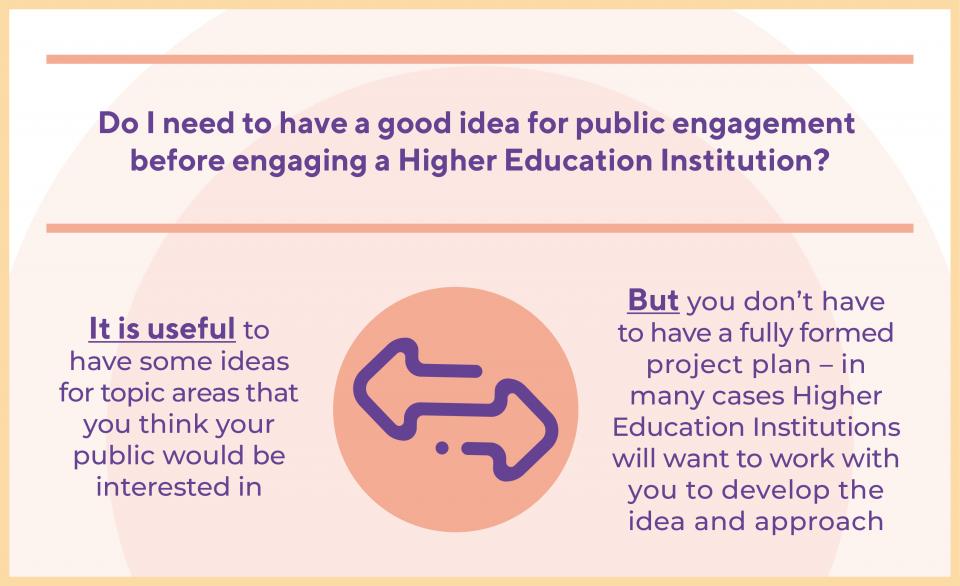Step 2

You can find a project partner using our interactive map
Don’t worry if you can’t find a suitable partner on the map. Two different library services talk below about how they found higher education partners even though they don’t have any local institutions:
Sign up to newsletters and join online communities:
- NCCPE public engagement network
- The Library Innovators’ network is a good place to ask for recommendations from library peers. If you work in a public library you can request to join this group by emailing info@librariesconnected.org.uk
Find people who can help you:
- Higher education librarians can be a good starting point for navigating a higher education institution (HEI)
- Search for the public engagement team in a HEI you are interested in working with
- Find a specific academic and contact them directly.
In the videos below, academics talk about the positive impact partnering with libraries on public engagement has had for them:
For more information on the drivers of partnerships for HEIs, the Higher Education and Public Libraries: Partnerships Research Independent Mind report by Arts Council England is very useful.
- Which audiences you routinely engage
- Where your libraries are located and what facilities they have
- What online presence you have and who engages with it
- What types of public engagement events you usually run e.g. rhyme times, job clubs, knit and natter sessions, cultural activities etc.
- Timeframes for setting up projects can be very different to public libraries – they can be a lot longer and activity can take place over numerous years
- Resource and capacity constraints: Academics tend to be very busy and their time can be very constrained – this can affect communication and engagement from the HEI
- Academic research is driven by topic/subject matter – they need to know that you understand what research they do and that you are interested in engaging with this
- Many HEIs work across wide geographies – your local HEI might not be the most relevant partner, depending on the focus of your public engagement topic.
There are many other toolkits available to help you develop and deliver successful partnership working, including:
- Nesta Partnership Toolkit
- Libraries Connected Expert Bank Partnership Toolkit
- The National Co-ordinating Council for Public Engagement Museum-University Partnership resources can help with library-university partnerships
In the videos below two different library services talk with, and about, their higher education partners and give tips for building strong partnerships:
These tips have been developed based on feedback from library services and higher education partners who have worked together on projects.
DO:
- Agree shared goals and aims with your HE partner. Understand what the aims of the researchers are and make sure you are both getting something out of the project.
- Have confidence in your own knowledge and expertise.
- Communicate regularly through the lifetime of the project. Online communication tools make this a lot easier to fit into busy days.
- Ensure that the library service is credited alongside the academic partner in marketing materials and literature about the project. Agreeing branding guidelines at the outset will ensure you get credit alongside your academic partner for your work.
- Have an open mind. You may have an idea about a partnership or project at the beginning but this may change as the project develops. Be open to changing your approach, but keep in mind your goals and aims.
- Look for academic partners you feel you can work well with. If your preferred choice is too busy or isn’t interested in your project then you may need to look for someone different.
- Be prepared to translate academic language for your audiences. Not all academic partners are used to preparing materials and workshops for the public. You can also work with public engagement professionals to support academics so that the public can engage with their work.
DON’T
- Undervalue what libraries bring to the project. You are likely to have a stronger understanding of communities and public engagement skills than many HE partners.
- Defer to academic partners because they have a higher ‘status’ as an institution. You may know more than them about the communities you are engaging, and the best way to do it.
- Be afraid to disagree. Honest and open communication will make the partnership stronger
- Expect HEIs to work to the same timescales as libraries. As mentioned before, they can take a lot longer to initiate and deliver projects than libraries.
- Expect academics to have an up-to-date understanding of public libraries. You may need to bring them up to speed about what libraries offer these days.


